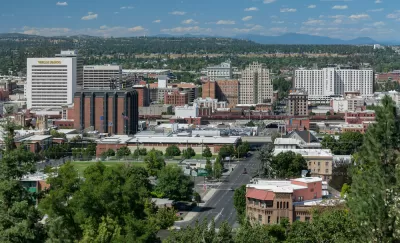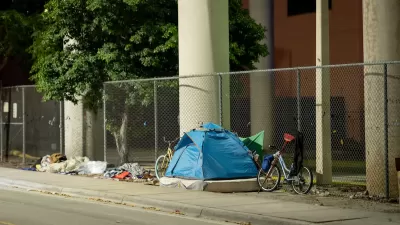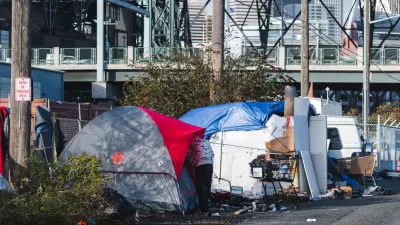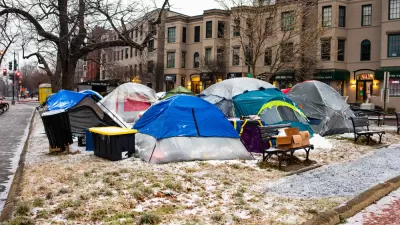With $24 million in state funding directed to Spokane’s efforts to reduce homelessness, city officials plan to relocate the over 600 residents of Camp Hope. But will services follow?

Writing for RANGE Media, Carl Segerstrom describes the uncertain future facing the residents of Camp Hope, a growing encampment located on land owned by the Washington Department of Transportation. “Covering a full city block just off of Interstate 90 a couple miles east of downtown Spokane, Camp Hope is home to more than 600 people, making it the largest encampment on state land in Washington.”
According to Segerstrom, “Service providers regularly visit the camp to connect residents with services like addiction treatment and healthcare. A dozen port-a-potties line the sidewalk and, on the day we visited, a shower trailer was available for residents to use.” As such, “The combination of on-site services and a tight-knit community has drawn people experiencing homelessness to the encampment.”
As Segerstrom writes, “What’s to come — more than $24 million in state funding and the relocation of the camp’s residents — is a testament to the endurance of the Camp Hope community and the intractability of the homelessness crisis in Spokane and across Washington.” But residents are worried about the future of their community and the options before them. “One solution that residents said they prefer over congregate shelters is pallet shelters — small, semi-permanent structures that are climate controlled and can be locked.” Segerstrom notes that “Surveys of 601 Camp Hope residents conducted by Jewels Helping Hands found that every camper would be willing to move into a pallet shelter or tiny home, and only 51 would be willing to go to a shelter, depending on the operator.”
How the funding will be used is yet to be decided by city and county officials, but there is some agreement on purchasing a hotel and renovating an existing shelter.
FULL STORY: Camp Hope residents built a community. Its future is not in their control.

Planetizen Federal Action Tracker
A weekly monitor of how Trump’s orders and actions are impacting planners and planning in America.

San Francisco's School District Spent $105M To Build Affordable Housing for Teachers — And That's Just the Beginning
SFUSD joins a growing list of school districts using their land holdings to address housing affordability challenges faced by their own employees.

The Tiny, Adorable $7,000 Car Turning Japan Onto EVs
The single seat Mibot charges from a regular plug as quickly as an iPad, and is about half the price of an average EV.

Seattle's Plan for Adopting Driverless Cars
Equity, safety, accessibility and affordability are front of mind as the city prepares for robotaxis and other autonomous vehicles.

As Trump Phases Out FEMA, Is It Time to Flee the Floodplains?
With less federal funding available for disaster relief efforts, the need to relocate at-risk communities is more urgent than ever.

With Protected Lanes, 460% More People Commute by Bike
For those needing more ammo, more data proving what we already knew is here.
Urban Design for Planners 1: Software Tools
This six-course series explores essential urban design concepts using open source software and equips planners with the tools they need to participate fully in the urban design process.
Planning for Universal Design
Learn the tools for implementing Universal Design in planning regulations.
Smith Gee Studio
City of Charlotte
City of Camden Redevelopment Agency
City of Astoria
Transportation Research & Education Center (TREC) at Portland State University
US High Speed Rail Association
City of Camden Redevelopment Agency
Municipality of Princeton (NJ)





























